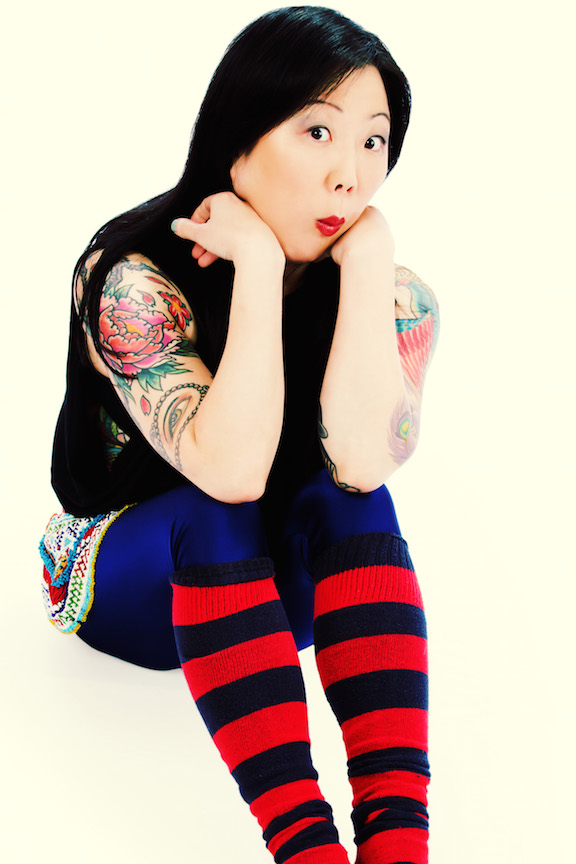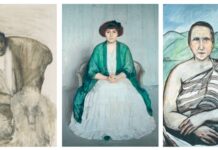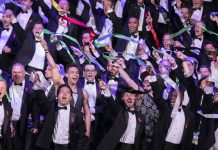Queer comedian Margaret Cho is back on the road—and she’s angry as hell. Luckily, she’s funny as hell too. See for yourself when she brings “The PsyCHO Tour” to Boston’s Wilbur Theatre on October 10 and makes bellies ache with her always uproarious, never-PC riffs on politics and pop culture. Cho is currently working on a new album, and also appears in the heralded new documentary “Do I Sound Gay?” that examines why gay men talk they way they do—and why it matters (or doesn’t).
But first, she spoke to Boston Spirit about her tour, equal marriage, social media and more.
Spirit: You named this “The PsyCHO Tour.” Why?
Cho: I think it’s a really scary time. The show is about being really frustrated—but at the same time elated. We had this wonderful thing happen with the Supreme Court legalizing marriage equality. But then you have all this other stuff: violence against women, racial unrest—these really big issues. It’s that kind of psychotic time that the show reflects.
Spirit: Do you think the mainstreaming of gay marriage has obfuscated some of the LGBT community’s radical movement?
Cho: I think marriage still came from the radical movement. Politically, it’s the radical movement that pushed us through the AIDS crisis and worked toward eradicating stigma; it was Act Up and the AIDS community claiming “we’re queer” that brought our community an awareness that emerged into the mainstream marriage equality movement. We’re always going to have to reflect on how we’re perceived politically, but I think the movement got a lot of leverage from the radical part of who we are.
Spirit: What about inter-culture discrimination? You identify as bi, and it seems like the bi community faces unique prejudices: The straights don’t want you, and neither do the Gs and Ls!
Cho: Well that’s something I talk about in the show: that I think it’s funny, the [bisexual] invisibility within the greater gay and lesbian community. It’s like our heterosexual side disqualifies our opinions, when we’re just as gay as we are straight.
Spirit: Social media has become ground zero for accusing comics of being “insensitive.” Do you think our culture is becoming too sensitive?
Cho: I think the sensitivity comes from social media not taking jokes in context. A lot of jokes are taken out of context and used as click bait to manufacture outrage. That’s what keep social media going! Jokes are dependent on the context of a situation. The censorship we see now has less to do with stand-up comedy as an art form and more to do with the fact that we have a way to voice our opinions on everything. … But you also want to utilize that [sensitivity] and play with it. It makes people more daring and more willing to say things that can be as offensive. That’s the nature of comedy. It’s almost like egging me on to do more. Comedians are that way.
Spirit: I think of offensive comedy like the S&M of live art. If I slap someone on the street it’s assault, but other times it’s play—because you’ve decided together that you’re entering a certain contract.
Cho: Until you say the safe word. But everyone’s saying the safe word.
Spirit: Election-wise, who are you pulling for in 2016?
Cho: I like Hillary a lot, and I like Sanders a lot. I think they’d be great on one ticket. Hillary’s been in the White House before, and I know she can handle the job. I was there during the Clinton administration going to state dinners. It’d be nice to be invited back when she’s running those. She throws a good party.
Spirit: Thoughts on Trump?
[Cho] Everybody is really interested in Donald Trump out of sheer entertainment, and the idea that people might vote for him is a joke. But on the other hand, ultimately the person who wins is the one who has the most money.
Spirit: Another comedian in the news lately: Cosby. What do you make of that situation? And is it possible to still think of him as a legend, knowing what we now know?
Cho: I think you can separate someone’s art from their humanity. What frustrates me about Bill Cosby is that people rush to defend him while they’d rather not believe all the victims who came forward with the same story. People hang on to him as an institution. And you can realize that he is an institution and also be able to think that he was wrong.
Spirit: Tell us about the documentary “Do I Sound Gay?”
Cho: It asked a lot of interesting questions. What does gayness actually mean? Is it an accent? Is it a demeanor? Is it a state of mind? What do those things have to do with how you present myself as a human being? It was an anthropological study to some extent, and an exploration of the different ways that we amplify our gender and our sexual identity.
Spirit: So—Do I sound gay?
Cho: You could sound gay. Or you could just be from Boston.
This Q&A appears in the September/October 2015 issue of Boston Spirit magazine.









